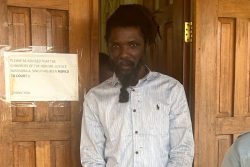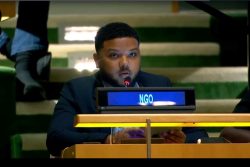Given that this administration has only a few more months to run, the haste with which important and challenging legislation is being brought to the House suggests that President Jagdeo wants to go down in history as the leader who presided over the passage of Access to Information and Broadcasting reform bills.
Never mind that both of these bills are destined for dissection in select committees in parliament and are unlikely to be put to use before scheduled elections.
Never mind that many of the unsavoury practices the bills seek to reverse and the relics they aim to dismantle have been prominently exhibited and curated by the Jagdeo administration.
Never mind that President Jagdeo’s government has the most unflattering track record of stultification of the broadcast sector by protecting the one-radio monopoly of the state while at the same time harassing media and shutting them off from state advertising.
Never mind that the bills have major deficiencies and if a new government is committed to their proper functioning there will have to be fundamental reshaping.
And so just a few weeks after Access to Information (ATI) legislation was brought, the government has now introduced the Broadcasting Bill 2011. It appears to have conveniently forgotten that it delayed this bill for 10 years on the grounds that it could reach no agreement with the PNCR on what had been previously agreed between President Jagdeo and the late PNCR Leader Desmond Hoyte. Perhaps there has been a mature acceptance that such disagreements, sharp or otherwise, do nothing to advance the interests of the country. We hope.
Like the ATI bill, the Broadcast Bill suffers from the oppressive shadow of the President in relation to the appointment of the governing board of the proposed Guyana National Broadcasting Authority. Here the President gets to name the chairman and all but one of the members. The Opposition Leader, after “meaningful consultation” with the Parliamentary opposition parties gets to nominate one person.
In the light of our experience in recent years with unsuitable appointments by the President and the zealous manner in which the appointees have set about discharging the mandate of the President to the detriment of the public interest it would be unwise to have such a mechanism for the head of the broadcasting authority.
While the bill is to be “construed and applied in a manner that is consistent with the right to freedom of expression and journalistic ethics, the provision and production of quality and balanced information for the Guyanese public” there is an uncomfortable amount of definition of what is acceptable and what should be considered as balance. These conditions could be perversely and effortlessly wielded like a hammer against those in the broadcast sector who this government finds to be troublesome or a threat to the propaganda line fed by the state media.
This is exactly how the move against the Christopher Ram/Ramon Gaskin programme on CNS Channel Six should be perceived. The government is rigidly set against programming that could set its constituency thinking and will ruthlessly clamp down. And so it will be with this legislation notwithstanding the veneer of respectability it is intended to confer. CNS Channel Six is the type of station immediately vulnerable to suspension of its licence or self-censorship for fear of economic damage. This explains the impending demise of the Ram/Gaskin show. The President having adjudicated in the case of the Vieira broadcast on CNS and suspended penalty has clearly presented the starkest options possible to the proprietors of the station.
The guidelines for the issuance of licences are also controversial and open to abuse. At Clause 32(i), the bill says that “all programmes should be fair and balanced in content and show a respect for truth in ways that do not under-represent any significant strand of thought, and that accuracy is founded on a commitment to check, cross-check and, wherever possible, to gather first-hand information from credible documentation, or official spokespersons of fully attributable eye-witnessed sources.”
While all broadcast houses would aspire to the foregoing, the reality is quite different and results in something very often less than this much vaunted ideal. So, many openings are contained in the bill to sanction those media deemed to be politically troublesome even though it is unlikely that the hand-maiden state media and the government’s friends in the private media will be targeted.
There are similar minefields in other parts of the bill. In one section, it says that programmes which address controversial public policy or matters of political or industrial contention “must meet standards of fairness and balance, accuracy, maintaining a proper balance and respect for truth and integrity and always ensuring that opposing views are not misrepresented.”
On the reporting of news, the bill says this should be objective, wide-ranging and well-informed and in reporting controversial matters “the main differing views should be given due weight in the period during which the controversy is active.” The bill appears to be deeply concerned about “controversy” and how this might impact on the public. The treating of a controversy by the media cannot be legislated and only a transgression arising from such a controversy would be properly in the bailiwick of a broadcast authority.
It also mentions the children of public officials where privacy is concerned. Clause 32 (m) says “the privacy of the individual and the private lives of individuals shall be respected in all cases, recognising that intrusions shall be justified on the basis of serving a greater good and that private behaviour should not be brought into the public domain unless there is a wider public interest; this also includes children of public officials.”
It would have been an enlightened clause if it had stated that public officials must be open to a higher standard of scrutiny and that unless malice is clearly present then fair comment is an adequate defence in reportage of alleged excesses and misdeeds.
Instead the bill simply says that all public comment “should be well-mannered and courteous; interviewees must always be given a fair chance to fully respond to questions and interviews should not be aggressive, hectoring or rude.” Surely, this circumscription has no place in a bill.
Interestingly, the bill says that at election time, licensees by agreement with political parties and in consultation with the Guyana Elections Commission can afford such parties air time on their stations. There should have been a section on the responsibility of the public broadcast media to open itself up to all sections of society in the utilization of the broadcast spectrum that it occupies on behalf of the public. Such an admonition is completely lacking. There should also have been a provision mandating air time on public media for all parties recognized by the Elections Commission as valid electoral contestants.
In the general provisions about licensed services, Clause 34 (1a) says that the authority shall do all to ensure that “nothing is included in its programmes which offends against good taste or decency or is likely to encourage or incite to crime or to lead to violence or threat to public order or to be offensive to public feeling.” Again, in the hands of supplicants, this Act would be a potent weapon against some broadcasters. As is the case with Clause 37 (3) which says the Minister responsible for broadcasting may also “at any time where it appears necessary or expedient by notice require the Authority to direct the licensees specified in the notice to refrain from including in the programmes any matter or class of matters specified in the notice; and the Authority shall comply with the notice.”
The most that can be hoped for is that the Act that is eventually passed will be subject to urgent and mature amendments by a new government to ensure that the broadcast sector is treated fairly, given the opportunity to grow and that the Act does not become the medium through which broadcasters are oppressed.








